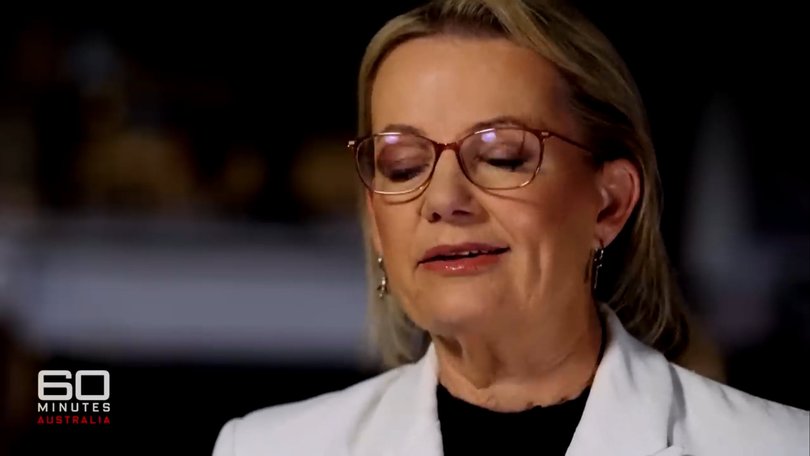Sussan Ley: 60 Minutes interview shows Lib leader searching for relevance as questions go unanswered
AARON PATRICK: The Liberal leader has an interesting background but questions remain over who is Sussan Ley and what she stands for.

There was a moment during Sussan Ley’s 60 Minutes interview on Sunday evening when reporter Tara Brown almost got the Liberal Party leader to cry.
Unfortunately for the show’s ratings, Ley held her composure as she talked about an awful week in May when she was forced to save the Coalition from death while watching her mother die.
The interview’s timing was important. Parliament meets on Tuesday for the first time since the Coalition’s devastating election loss on May 3. Ms Ley is trying to rebuild her demoralised party’s primary support, which this week hit the lowest level recorded in Newspoll history.
Sign up to The Nightly's newsletters.
Get the first look at the digital newspaper, curated daily stories and breaking headlines delivered to your inbox.
By continuing you agree to our Terms and Privacy Policy.Ms Ley’s first step is explaining to Australians who she is. Her second will be to demonstrate what she stands for. There’s a lot of material for the first: the daughter of an MI6 spy, she went from high school failure to high office.
The 60 Minutes profile focused on one of the best-known aspects of Ms Ley’s private life: she’s one of Australia’s 30,000-odd pilots. The aircraft Ms Ley uses to get around her NSW electorate, which stretches from Albury to the South Australian border, might have been an interesting angle to pursue.
Government records indicate Ms Ley bought the four-seat Cessna Skylane she was filmed flying last October. The price is not public, but similarly aged models sell for $750,000, according to aircraft marketplaces. A Rolls-Royce Phantom of the same age would have cost about half the price.
Coercion, control
More consequentially, Ms Ley had the opportunity to explain what she meant last month when she alluded to being a victim of domestic violence. “I understand the pain that comes with coercion and control because I have felt that pain too,” she told the National Press Club on June 25.
Asked for an explanation by television journalist Ms Brown, Ms Ley replied: “As a young woman, I didn’t really understand what was happening.”
Neither did the viewers. Mr Ley refused to elaborate, or explain why she would not discuss her personal experience of a problem that has overshadowed Australian political life — and contributed to the destruction of several parliamentary careers — since a young former ministerial adviser named Brittany Higgins went on television in February 2021 to claim she had been raped inside Parliament House.
“This is not about me,” Ms Ley said. “This is about the women of Australia.”
Which is a questionable assertion for anyone to make in a television profile. Ms Ley is entitled to keep a sensitive aspect of her personal life private. But having presented herself as a victim of domestic violence to win over voters, especially women, she should expect journalists to ask for the details.
A personal mystery
There’s a saying that’s particularly apt for politicians: to understand someone, look at whom they marry or date. As the alternate prime minister, Ms Ley’s relationship status is of interest to voters. She’s a public figure and a relatively young grandmother. People will become more curious as she becomes better known. Her office refuses to discuss it.
Ms Ley separated from the father of her three children in 2004 after 17 years of marriage. An ex-partner died in a car crash in 2022. Who, if anyone, provides the personal advice and emotional support only an intimate partner can to this public figure is a mystery.
Ms Ley will need much of both as she takes on Prime Minister Anthony Albanese, who may posses more political capital than any PM since Liberal John Howard won the 2001 election.
Monday’s Newspoll, which puts the Labor Party ahead 57 to 43 per cent, demonstrates that voters do not consider the Liberal leader a real option for The Lodge. To persuade them, she needs to show not just where she came from, but the foundational principles of her life.
Core beliefs?
Her predecessors, with the exception of Malcolm Turnbull, were conservatives. Ideological biases defined them, from Tony Abbott’s love of the monarchy to Peter Dutton’s belief in tough criminal penalties. They helped voters interpret their actions and decisions.
Elected by the party’s left, Ms Ley’s core beliefs are a mystery beyond a generic adherence to private enterprise and personal freedom. What’s the one policy position she would give up her leadership for? No one knows.
The weak opposition leaves Australia in a vulnerable position. Buoyed by their overwhelming election victory, the Labor Party’s union financiers are preparing to attack the foundations of Australia’s modern wealth.
At a three-day meeting of pressure groups in Canberra next month to discuss the nation’s future, some unions will push for a return to the economic protectionism of the 1970s and early ‘80s. They want to abolish or change the Productivity Commission, an economic think tank funded by government which operates independently. They dislike its influence as a free markets advocate.
Upon such totemic questions the Liberal Party was once defined. The Government has given Ms Ley an opportunity to play serious politics, rather than fly circuits around Albury Airport.

